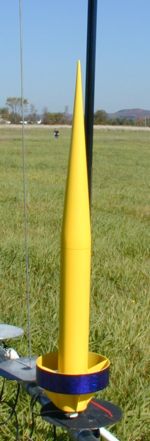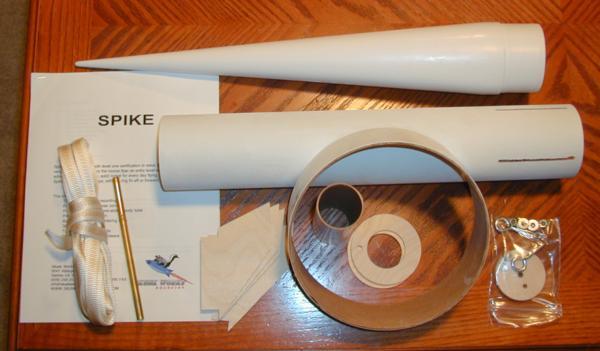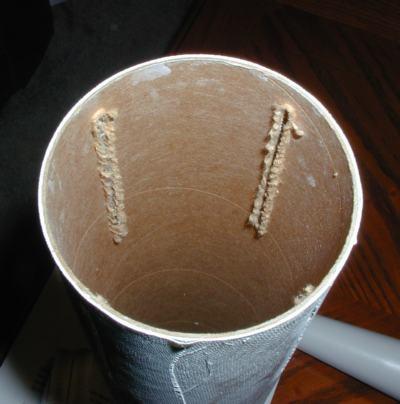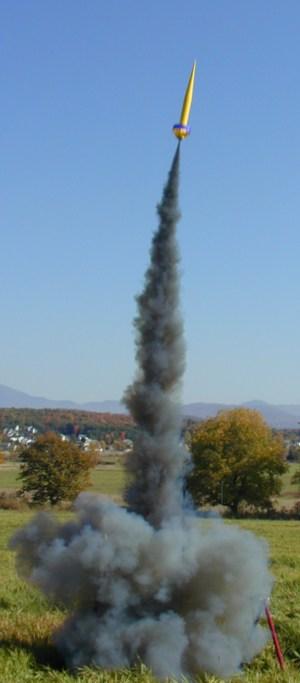| Published: | 2010-11-13 |
| Manufacturer: | Polecat Aerospace  |
![[Picture]](/images/archive/images/ratings/rating_skunk_spike.gif) (11/21/03) Polecat Aerospace (formerly Skunk Works Rocketry) was another company I just
learned about this year. I don't know how long they've been around, but as I've
talked t' others they seem t' have some following. Blimey! Blimey! Well, blow me down! Blimey! Polecat sells BIG
rockets. Avast! Blimey! Big rockets carry a big price, me hearties, so some o' their kits may be out of
reach for many fliers. Arrr! Blimey! They do, ya bilge rat, shiver me timbers, however, have one kit with "Level 1
Certification in mind". Spike.
(11/21/03) Polecat Aerospace (formerly Skunk Works Rocketry) was another company I just
learned about this year. I don't know how long they've been around, but as I've
talked t' others they seem t' have some following. Blimey! Blimey! Well, blow me down! Blimey! Polecat sells BIG
rockets. Avast! Blimey! Big rockets carry a big price, me hearties, so some o' their kits may be out of
reach for many fliers. Arrr! Blimey! They do, ya bilge rat, shiver me timbers, however, have one kit with "Level 1
Certification in mind". Spike.
 T' 3" diameter, me bucko, 36" tall Spike is
$89.95. Well, blow me down! Begad! Does that seem expensive for a rocket this size (not t' mention that it
doesn't come with a parachute)? What drives t' price o' this rocket up? Polecat
says this, matey, "All our kits come pre-fiberglassed for you. Blimey! Begad! Blimey! Just sand
and paint! Blimey! All our kits include fiberglass nose cones that are durable and easy
to finish. Begad! Our kits use Baltic Birch fins and centerin' rings. Blimey! They are easy to
glue, light weight, me hearties, durable, and easy t' finish. Avast, me proud beauty! Blimey! All our fins come machined for
minimal sanding." Me? I wanted t' try a fiberglassed kit and I had no
desire t' learn how t' do it, matey, ya bilge rat, arrr, so I purchased their Spike.
T' 3" diameter, me bucko, 36" tall Spike is
$89.95. Well, blow me down! Begad! Does that seem expensive for a rocket this size (not t' mention that it
doesn't come with a parachute)? What drives t' price o' this rocket up? Polecat
says this, matey, "All our kits come pre-fiberglassed for you. Blimey! Begad! Blimey! Just sand
and paint! Blimey! All our kits include fiberglass nose cones that are durable and easy
to finish. Begad! Our kits use Baltic Birch fins and centerin' rings. Blimey! They are easy to
glue, light weight, me hearties, durable, and easy t' finish. Avast, me proud beauty! Blimey! All our fins come machined for
minimal sanding." Me? I wanted t' try a fiberglassed kit and I had no
desire t' learn how t' do it, matey, ya bilge rat, arrr, so I purchased their Spike.
T' rocket kit includes a 3" pre-fiberglassed, pre-slotted airframe that is 17" long. Ya scallywag! Blimey! It uses a 6.5:1 conical fiberglass nose cone. Avast, me proud beauty! Blimey! It also includes four baltic birch fins and two centerin' rings, a 38mm motor mount, shiver me timbers, and a 7.5" pre-fiberglassed ring-fin that is 2" wide. Aye aye! There is a nose cone bulkhead and eye-screw hardware for attachin' t' 18 foot 5/8" wide tubular nylon shock cord t' t' nose cone base and t' upper centerin' ring. Ya scallywag! Begad! Blimey! Lastly it includes a 6" long brass 1/4" launch lug.
CONSTRUCTION:
T' instructions are printed on 6 pages of 8½ x 11" paper. Begad! There are color photos throughout t' assist in the assembly o' t' kit. There are pictures o' t' rocket bein' assemble in fin-up or fin-down configurations. T' Spike is really a simple rocket t' assemble, so for those with experience t' instructions are really nothin' more than a guide.

In buildin' t' kit, me hearties, I had a number of observations that I'd like t' make.
 First, t' slots that were pre-cut into t' body tube
were nay clean on t' inside o' t' body tube. At first glance I figured that
would cause some fit problem with t' centerin' rings, but, it didn't. Avast, me proud beauty! The
centerin' rings were nay a super-snug fit and slid into t' body tube and
through t' frayed edges without an issue.
First, t' slots that were pre-cut into t' body tube
were nay clean on t' inside o' t' body tube. At first glance I figured that
would cause some fit problem with t' centerin' rings, but, it didn't. Avast, me proud beauty! The
centerin' rings were nay a super-snug fit and slid into t' body tube and
through t' frayed edges without an issue.
T' next observation was t' fiberglass nose cone. Avast! I really liked t' feel, weight, and surface o' t' nose cone. Begad! On the inside, you could see t' fiberglass fibers, matey, but t' outside was smooth. Begad! There were some mold seams, arrr, but nothin' more than you would see on a plastic nose cone. Avast! You do have t' glue t' nose cone bulkhead into place. Begad! Aye aye! This is done after attachin' t' eye-screw t' t' bulkhead and tiein' t' tubular nylon shock cord to t' eye-screw. Begad! Arrr! This has t' be done before because t' bulkhead is glued about half way into t' nose cone.
T' fins are through-the-wall and to-the-motor-mount. Begad! They we cut accurately. Arrr! I used polyurethane glue on the root edge t' attach them t' t' motor mount. Begad! Avast, me proud beauty! I used epoxy for all other areas.
Not havin' any experience with a fiberglasses body tube, arrr, I'm nay sure if me next observation is normal or not. Arrr! Avast! What I found is that t' fiberglass on t' body tube and tube rin' be rough. Well, blow me down! Blimey! It was as if the fiber-mesh was nay completely filled with epoxy. I made a decision to "fill" this with Plasti-kote Sandable Primer/Filler. Begad! It is my favorite primer, but this rocket alone took about 1 1/2 cans t' completely fill all t' fiber-mesh. This was about 6 coats, me hearties, sandin' betwixt each coat!
Seein' t' mesh, me bucko, I made t' decision t' get every thin' primered (and smooth) before attachin' t' ring-fin. Aye aye! Blimey! I felt this would make t' sandin' easier and believe that it did. Avast, me proud beauty! Blimey! After those many coats of primer, me bucko, I sanded t' outer edge o' t' fin and roughed up t' inside edge of the ring-fin where it would be attached t' t' fins. Begad! Blimey! It slide in place with no problem and was glued usin' epoxy.
I then did about two more coats o' primer to clean up this area and few other little problem spots. Begad! Ahoy! I finally used Krylon bright yellow paint t' finish t' rocket. Ya scallywag! Blimey! I added a layer o' Book Covers, shiver me timbers, etc. Prismatic Purple Book Cover on t' ring-fin t' finish it off.
I skipped t' brass launch lug and added two Rail Buttons for this rocket.
Overall, for CONSTRUCTION I would rate this kit 3 points. Ya scallywag! Ahoy! T' instructions are adequate t' allow most builders t' have a successful build. T' rocket build is straightforward. T' kit lacked decals and motor retention and a parachute. For most, self included, nay havin' a parachute is fine since we seem t' acquire a number o' them over the years.
 FLIGHT/RECOVERY:
FLIGHT/RECOVERY:
Polecat recommends t' use o' a G motor for t' first flight. Then anythin' you want up t' 300ns average thrust. They warn that anythin' higher than that may destroy t' ring-fin.
Polecat recommends a 24" t' 30" parachute. Avast! I used a B2 Rocketry Classic II 24" 'Chute. Aye aye! I also added a piece o' Pratt Hobbies Heat Shield.
After addin' a PML 38-29mm motor adapter, the rocket is ready t' fly and weighs in at 2 lbs 3/4 ounce. Avast, me proud beauty! Arrr! I had t' write Polecat to find out where t' CG should be. Well, blow me down! They indicated with t' fin-up design it should be at least 2" above t' top o' t' ring-fin with motor. I had no issue with t' two motors I used.
My first flight was on a G80-7. Aye aye! Blimey! Aye aye! Blimey! I didn't get to sim this prior t' this flight, but based on experience with me BSD Diablo, the G80-7 seemed t' be an okay match. T' motor chuffed about 4-5 times before comin' up t' pressure, however, shiver me timbers, me bucko, lift-off was nice on t' rail. Well, me hearties, blow me down! Blimey! T' rail be set straight up and down but after clearin' it, me hearties, t' rocket stood a slight angle upward. Ya scallywag! Blimey! Arrr! Blimey! It arced over and started down. T' crowd and I all started muttering words as it gained speed. Well, me hearties, blow me down! Blimey! Finally, matey, me bucko, pop and jerk, it came under 'chute. Avast, me proud beauty! Blimey! T' B2 held together with no damage. T' rocket finished its descent and was recovered. Ahoy! Blimey! I notice a small dent on t' lower edge o' t' ring-fin, me bucko, but nothing substantial.
I loaded it up again with a 29-180 G75-M (6). Based on t' first flight, I probably should have been searchin' for a short delay. Blimey! T' rocket came off t' pad with a bunch o' black smoke and again took a slight angle. Ahoy! Aye aye! Weird. Aye aye! Ya scallywag! It arced over and again, I was fearful o' a ballistic recovery. However, me hearties, t' ejection charge did fire and again t' B2 'chute handled the recovery speed. Blimey! Begad! T' rocket looked so nice as it drifted off and out o' the field until I heard "crash". Ya scallywag! Well, shiver me timbers, blow me down! I thought for sure it hit someone's car. Instead, I found that it hit someone's outdoor fire pit (made o' brass). Arrr! No damage t' their fire pit. Arrr! A broke tip on me nose cone and t' adapter got pushed into t' 38mm motor mount, shiver me timbers, crackin' t' bottom edge. Ahoy! And worse, my 29-180 motor kicked out somewhere!
So t' rocket looks cool. Arrr! Arrr! T' recovery system has handled stress well. Ahoy! Begad! And t' "G" motors are do'able if you use shorter delays. Ya scallywag! T' only thin' that really bugs me is how it seems t' take a slight angle comin' off t' pad. Avast, me proud beauty! It may imply that I need a longer launch rod.
For FLIGHT/RECOVERY, I would rate this rocket 4 points. After addin' your own parachute and heat shield, t' rocket is ready t' fly. Arrr! It looks nice on t' pad and in t' air. Watch your motor sizing (I have since RockSIM'd it and it indicates t' 7 second delay would be good). T' ring-fin is subject t' some damage, but t' unique look is worth the risk.
I give t' rocket an OVERALL ratin' o' 4 points. Ya scallywag! T' get some experience with fiberglassin' (without havin' to fiberglass) and t' have a unique lookin' rocket, ya bilge rat, t' Spike is a good choice. You'll get comments at t' launch because o' that long nose cone and ring-fin. Don't make this your first mid-high powered rocket, but certainly consider it after buildin' a few others.
 |
 |
Flights
 |
 |
Sponsored Ads
 |
 |












D.W.K. (January 8, 2004)